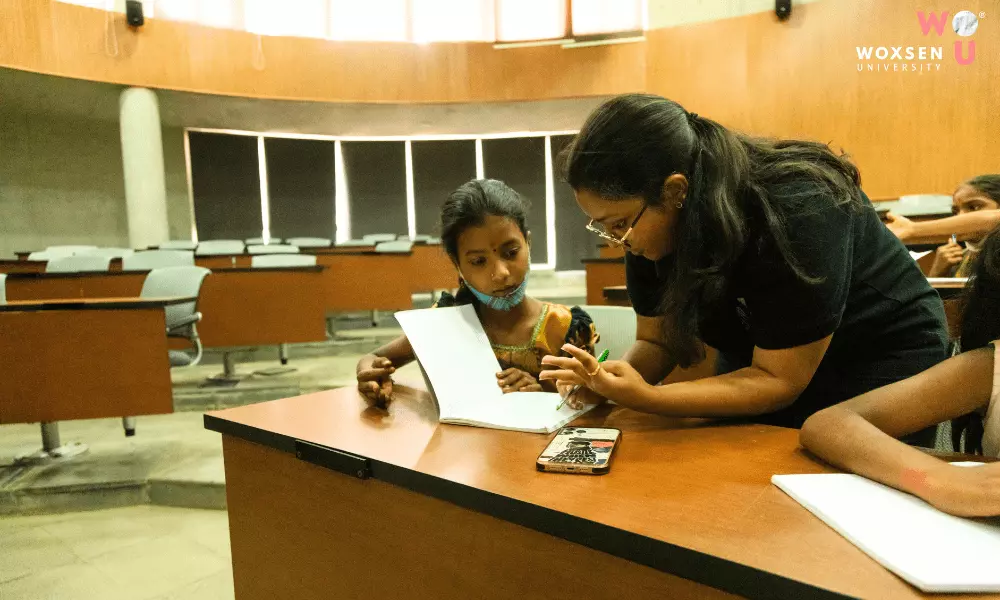
Image Credits: Woxsen University
Shaping Tomorrow's Graduates: The 3-Fold ERS Approach
India, 20 Sep 2023 7:12 AM GMT
Woxsen University's Holistic Approach to Education: Nurturing Responsible Leaders for an Ethical and Sustainable Tomorrow
As the world evolves and challenges become more complex, the role of higher education institutions in shaping responsible and ethically conscious leaders becomes paramount. This is where Woxsen University, located in the heart of Hyderabad, India, steps into the spotlight with its pioneering approach to education - Ethics, Responsibility, and Sustainability (ERS). These are more than just buzzwords; they are the foundation upon which Woxsen University builds its educational ecosystem. But what exactly is ERS?
Understanding ERS
Ethics, Responsibility, and Sustainability (ERS) go beyond traditional classroom learning. It's about instilling values that guide individuals to make morally sound decisions, contributes positively to society, and ensure a sustainable future. Woxsen University Hyderabad takes this commitment seriously and aligns its educational practices with the United Nations Principles of Responsible and Management Education (PRME). These principles form the foundation of an educational ecosystem that equips students to be future leaders with a deep sense of purpose.
The ERS approach at Woxsen University seamlessly integrates with the United Nations Sustainable Development Goals (SDGs). These goals are a blueprint for a better and more sustainable future for all, addressing global challenges such as poverty, inequality, climate change, environmental degradation, peace, and justice. By weaving ERS into its curriculum and initiatives, Woxsen ensures that its graduates are well-prepared to contribute towards achieving these goals.
Holistic Implementation of ERS at Woxsen University
One of the top private universities in India, Woxsen University's commitment to Ethics, Responsibility, and Sustainability (ERS) transcends theoretical concepts, integrating these values into every facet of its educational environment. The university's approach to ERS is evident across three vital fronts: Pedagogy, Wellness, and Corporate Social Responsibility (CSR), creating a comprehensive ecosystem for nurturing responsible leaders of tomorrow.
Pedagogy: The curriculum integrates PRME principles and REC contributions, fostering an understanding of sustainability. Distinguished faculty instill responsible values, while global collaborations drive SDG alignment and recognition.
Wellness: The Wellness Centre prioritizes mental well-being with counseling, awareness programs, and support groups, creating a thriving campus environment.
CSR: Upholding ethics, environmental stewardship, and economic responsibility, Woxsen engages in scholarships, Covid response, and community partnerships.
Empowering Students for a Sustainable Future: Woxsen's Notable Initiatives
Woxsen University's commitment to Ethics, Responsibility, and Sustainability (ERS) comes to life through inspiring student-led projects that drive positive change. These stories reflect the university's dedication to creating a brighter future:
1) Woxsen Elevate Program:
Woxsen University Partnered with Monmouth University in the USA, birthing the 'Woxsen-Monmouth Elevate Program.' This visionary initiative was conceived as a six-month social impact project, driven by an unwavering mission to uplift underprivileged students in Telangana, India, who aspired to a brighter future.
With resolute commitment, the Elevate Program aligned its objectives with the United Nations Sustainable Development Goals, targeting Good Health and well-being, Quality Education, Reduced Inequalities, and Economic Growth. The program was meticulously calibrated to meet the exacting standards set by prominent international accreditation bodies like AACSB, EFMD, and AMBA, to which Woxsen University proudly holds accreditation and memberships.
Close to 300 students, aged 4 to 18, residing in neighboring areas were the fortunate beneficiaries of this ambitious endeavor.
The Elevate Program's significance was profound:
● It empowered children to exercise their fundamental right to quality education.
● It addressed the pressing issue of educational inequality.
● It provided access to a global platform and opportunities, broadening horizons.
● It raised awareness about the well-being of these children, highlighting their unique needs and potential.
2) Project Aspiration:
Woxsen University's commitment to fostering an inclusive ecosystem and empowering its surrounding community has given rise to Project Aspiration. This initiative, spearheaded by Woxsen's Centre of Excellence for Diversity, Equity & Inclusion, is specifically designed for ambitious girls in Classes IX-XII.
Project Aspiration takes shape through a 'Train the Trainer' workshop. This intensive training program is led by Woxsen University's postgraduate students and faculty members.
Over three weeks, participating girls delve into various facets of their future, cultivating SMART goals and learning strategies to attain them. Professors from diverse fields at Woxsen University enlighten them about higher education opportunities and career prospects. Counselor at Woxsen University imparts crucial insights into mental health and counseling. The team also orchestrated debates and discussions on pivotal social issues, stimulating young minds. This endeavor empowers marginalized girls while simultaneously enhancing the project management skills of MBA students.
3) Human-Centred Design Collaboration:
Woxsen University's Product Design Department and PUCPR-Brazil's MBA/BBA department joined forces for an exciting 3-week "Human Centred Design" course. Guided by teachers from both schools and operating under the Centre of Excellence for Ethics, Responsibility, and Sustainability, students worked in 6 groups. Each group included Management students from PUCPR, Brazil and Product Design students from Woxsen
Their mission: Identify shared issues in Brazil and India and devise solutions to benefit local rag-picking communities. Emphasizing concepts like Upcycling, students conducted field research and brainstormed ways to transform waste into valuable resources. The 6 groups addressed specific waste management challenges:
● E-waste management.
● Recycling/upcycling waste from educational institutes.
● Upcycling hospital waste.
● 'Agrosupp' solution for hospitality industry waste.
● Temple waste management.
● Tackling plastic waste in public transport areas.
4) On-campus Vertical Farming & Plantation Drives
Woxsen University is committed to modern sustainability practices, exemplified by its embrace of ERS (Environmental Responsibility and sustainability). The university is pioneering vertical farming methods on its campus, harnessing technology and indoor cultivation techniques to enhance crop yields while conserving land and water resources. Additionally, the university maintains a vegetable garden fertilized with food waste-generated manure. As part of its dedication to environmental consciousness, the entire campus operates on solar energy. Notably, Woxsen University encourages student involvement through plantation drives, fostering team bonding, and introducing students to ERS principles right from the outset of their university journey.
5) Student Patents:
● Portable De-Moisturiser for Natural Produce:
B.Tech - CSE students Ms. Aditi Baggu and Mr Vignesh Devamulla have received a patent for their work titled 'Portable Demoisturizer for Natural Produce. ' This device can be temporarily attached to a vehicle, making it easily accessible for farmers. It significantly speeds up the drying process, saving time and reducing waste.
● Integrated Structural Health Monitoring System (ISHMS):
In a remarkable feat of innovation, B.Tech students, namely Manjith Reddy, Aditi Baggu, Gurram Sai Vinil, and Sahiti Lakkoju have achieved a significant milestone by securing a patent for their pioneering work titled "Integrated Structural Health Monitoring System and Method".This portable system is capable of assessing a structure's strengths, elasticity, deflections in beams, and even the quality of skeletal elements. It can identify the presence and intensity of voids and cracks, ensuring the safety and integrity of structures.
● Intelligent Domestic Waste Digester:
Addressing the pressing challenge of converting waste into valuable resources, Woxsen students have unveiled the ingenious 'Intelligent Domestic Waste Digester.' This remarkable innovation stands as the brainchild of these forward-thinking students, who ingeniously crafted a system capable of not only gathering domestic bio-waste but also kickstarting the digestion process, yielding both nutrient-rich solid and liquid manure. At the heart of this revolutionary waste management solution lies the incorporation of sensory modules and an advanced Artificial Intelligence Module (AIM), showcasing a synergy of technology and sustainability that truly brings environmental consciousness to our very doorstep. Through the fusion of elements such as bioaccumulators and AI-driven processes, this pioneering system exemplifies a new frontier in waste utilization and resource optimization.
Woxsen University's dedication to ERS earned global recognition when it achieved Level 5 in the Positive Impact Rating (PIR) 2022. As one of the few universities in India to attain this distinction, Woxsen's holistic approach to education stands out on the global stage. Furthermore, Woxsen University has been selected as PRME (United Nations Compact) Champions 2023, among the top 50 universities and institutions to be selected globally. In a world that demands not just expertise but also ethical responsibility and sustainability, Woxsen University stands as a beacon of progressive education. By prioritising ERS principles, the university ensures that its graduates are equipped to navigate complex challenges with a strong moral compass, a commitment to societal betterment, and a dedication to sustainable practices. As the world evolves, Woxsen's graduates will be at the forefront, driving positive change and shaping a more ethical, responsible, and sustainable future.
 All section
All section













